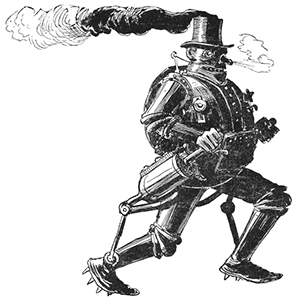A pastiche [pa-steesh] is a work of visual art, literature, theatre, or music that imitates the style or character of the work of one or more other artists. Unlike parody, pastiche celebrates, rather than mocks, the work it imitates. The word pastiche is a French cognate of the Italian noun ‘pasticcio,’ which is a pâté or pie-filling mixed from diverse ingredients.
Metaphorically, pastiche and pasticcio describe works that are either composed by several authors, or that incorporate stylistic elements of other artists’ work. They are examples of eclecticism in art. Pastiche is sometimes confused with allusion, but a literary allusion may refer to another work, but it does not reiterate it. Moreover, allusion requires the audience to share in the author’s cultural knowledge. Both allusion and pastiche are mechanisms of intertextuality (the shaping of a text’s meaning by another text).
read more »
Pastiche
Weird Al Yankovic
Weird Al Yankovic (b.1959) is an American musical comedian whose humorous songs make light of popular culture and often parody specific songs by contemporary musical acts; original songs that are style pastiches of the work of other acts; and polka medleys of several popular songs, featuring his favored instrument, the accordion.
Since his first-aired comedy song in 1976, he has sold more than 12 million albums (as of 2007), recorded more than 150 parody and original songs, and performed more than 1,000 live shows. His works have earned him five Grammy Awards and a further eleven nominations, four gold records, and six platinum records in the United States. Yankovic’s first top ten Billboard album (‘Straight Outta Lynwood’) and single (‘White & Nerdy’) were both released in 2006, nearly three decades into his career.
read more »
Hideo Kojima
Hideo Kojima (b. 1963) is a Japanese video game designer, screenwriter, director, and producer. He is the director of Kojima Productions, which he originally founded in 2005, and a former vice president of Konami Digital Entertainment. He is often regarded as an ‘auteur’ video game director.
He is the creator, director and writer of a number of widely praised video games, including the ‘Metal Gear’ series of stealth games, and the adventure games ‘Snatcher’ and ‘Policenauts,’ and he also directed or produced games in other series, including ‘Zone of the Enders,’ ‘Boktai,’ and ‘Castlevania: Lords of Shadow.’
read more »
Edisonade
Edisonade is a modern term, coined in 1993 by John Clute in his and Peter Nicholls’ ‘The Encyclopedia of Science Fiction,’ for fictional stories about a brilliant young inventor and his inventions. This subgenre started in the Victorian and Edwardian eras and had its apex of popularity during the late 19th and early 20th centuries, and was common in ‘scientific romance,’ an archaic term for the genre of fiction now known as ‘science fiction.’
The term ‘Edisonade’ originated in the 1850s to describe both fiction and elements of scientific writing, but has since come to refer to the science fiction of the late nineteenth and early twentieth century, primarily that of Jules Verne, H. G. Wells, and Arthur Conan Doyle. In recent years, the term has come to be applied to science fiction written in a deliberately anachronistic style, as a homage to or pastiche of the original scientific romances.
read more »
Hacker Koan
Out of hacker culture, and especially the artificial intelligence community at MIT, there have sprung a number of humorous short stories about computer science dubbed hacker koans [koh-ahns]; most of these are recorded in an appendix to the Jargon File (a glossary of computer programmer slang). Most do not fit the usual pattern of koans, but they do tend to follow the form of being short, enigmatic, and often revealing an epiphany.
One notable example, titled ‘Uncarved block,’ describes an exchange between professor Marvin Minsky and student Jerry Sussman: ‘In the days when Sussman was a novice, Minsky once came to him as he sat hacking at the PDP-6. ‘What are you doing?’, asked Minsky. ‘I am training a randomly wired neural net to play Tic-tac-toe,’ Sussman replied. ‘Why is the net wired randomly?’, asked Minsky. ‘I do not want it to have any preconceptions of how to play,’ Sussman said. Minsky then shut his eyes. ‘Why do you close your eyes?’ Sussman asked his teacher. ‘So that the room will be empty.’ At that moment, Sussman was enlightened.’
read more »
Beyond the Black Rainbow
Beyond the Black Rainbow is a 2010 Canadian science fiction film written and directed by Panos Cosmatos in his feature film debut. The films begins in the 1960s, as Dr. Arboria founds the Arboria Institute, a New Age research facility dedicated to finding a reconciliation between science and spirituality, allowing human beings to move into a new age of perpetual happiness.
In the 1980s, Arboria’s work has been taken over by his protégé, Dr. Barry Nyle. Outwardly a charming, handsome scientist, Nyle is in fact a psychopath who has been keeping Elena, a teenage girl, captive in an elaborate prison/hospital beneath the Institute. Elena demonstrates psychic capabilities, which Nyle can suppress, using a glowing, prism-like device.
read more »
Psychic TV
Psychic TV (PTV, sometimes spelled Psychick TV) is a video art and music group that primarily performs psychedelic, punk, electronic and experimental music. The band was formed by performance artist Genesis P-Orridge and video director Peter Christopherson (after the breakup of Throbbing Gristle) with Alex Fergusson, musician and producer (a key member of Alternative TV for whom P-Orridge had played percussion).
The band began publishing a monthly series of 23 live albums in 1986, but stopped without explanation after only 17. The tenth, a picture disk most commonly referred to as ‘Album 10,’ could only be obtained by submitting tokens contained in each of the previous nine releases. The band subsequently earned an entry in the ‘Guinness Book of World Records’ for most records released in one year.
read more »
Not Brand Echh
Not Brand Echh was a satiric comic book series published by Marvel Comics that parodied its own superhero stories as well as those of other comics publishers. Running for 13 issues from 1967 to 1969, it included among its contributors such notable writers and artists as Stan Lee, Jack Kirby, Gene Colan, Bill Everett, John and Marie Severin, and Roy Thomas.
With issue #9, it became a 68-page, 25¢ ‘giant,’ relative to the typical 12¢ comics of the times. Its mascot, ‘Forbush Man,’ introduced in the first issue, was a superhero wannabe with no superpowers and a costume of red long johns emblazoned with the letter ‘F’ and a cooking pot, with eye-holes, covering his never-revealed head. His secret identity was eventually revealed in issue #5 (Dec. 1967) as Irving Forbush, Marvel’s fictitious office gofer.
read more »
Appropriation
Appropriation [uh-proh-pree-ey-shuhn] in the arts is the use of pre-existing objects or images with little or no transformation applied to them. The use of appropriation has played a significant role in the history of the arts (literary, visual, and musical).
Appropriation can be understood as ‘the use of borrowed elements in the creation of a new work.’ In the visual arts, to appropriate means to properly adopt, borrow, recycle, or sample aspects (or the entire form) of man-made visual culture. Most notable in this respect are the ‘Readymades’ of Marcel Duchamp (are ordinary manufactured objects that the artist selected and modified, as an antidote to what he called ‘retinal art’).
read more »
Swipe
Swipe is a comics term that refers to the intentional copying of a cover, panel, or page from an earlier comic book or graphic novel without crediting the original artist.
Artists Jack Kirby, Neal Adams, Hergé, and Jim Lee are common targets of swipes (though even ‘The King’ is not above reproach: Kirby was known to have swiped from Hal Foster early in his career, as were many Golden Age artists — many of whom kept ‘swipe files’ of material to be copied as needed).
read more »
Cultural Impact of Star Wars
George Lucas’ six-film Star Wars saga has had a significant impact on modern American popular culture. ‘Star Wars’ references are deeply embedded in popular culture; references to the main characters and themes of Star Wars are casually made in many English-speaking countries with the assumption that others will understand the reference. Darth Vader has become an iconic villain. Phrases like ‘evil empire’ and ‘May the Force be with you’ have become part of the popular lexicon. The first ‘Star Wars film’ in 1977 was a cultural unifier, enjoyed by a wide spectrum of people.
Science fiction since the original 1977 ‘Star Wars,’ particularly in film, has often been influenced by and compared to ‘Star Wars.’ Sounds, visuals, and even the music from the films have become part of the tapestry of American society. The film also helped launch the science fiction boom of the late 1970s and early 1980s, and made science fiction films a blockbuster genre. It has also been parodied in films and short videos, such as ‘Spaceballs.’
read more »














